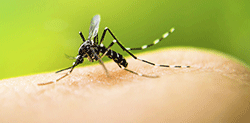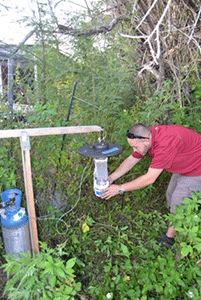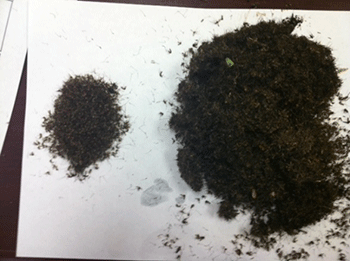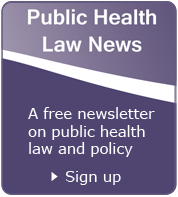November 2016—Public Health Law News

 Public Health Law Program
Public Health Law Program
Office for State, Tribal, Local and Territorial Support
Centers for Disease Control and Prevention
![]() Subscribe to Public Health Law News
Subscribe to Public Health Law News
In this Edition
Announcements: Public Health Grand Rounds, Webinars About Bioethics and Shelter Rules
Save the Date for CDC Grand Rounds About Public Health Law. CDC will present “Public Health Law: A Tool to Address Emerging Health Concerns” on Tuesday, December 13, 2016 from 1:00 to 2:00 pm (EST) at CDC’s Roybal Campus in Atlanta, Georgia. A live external webcast will be available via the Webcast Links section of CDC’s website. For individuals who are unable to view the session during the scheduled time, a video of the session will be posted in the archives section 2-3 days after the presentation. Due to security measures at CDC’s Roybal campus, non-CDC staff who wish to attend the session in person must have prior clearance and a U.S. state-issued photo ID (e.g., driver’s license, U.S. passport). Names of non-CDC staff (both domestic and international) who wish to attend in person should be submitted to the Grand Rounds Team. Please note that all information for international visitors must be submitted at least 10 business days in advance.
Webinar: Exploring Trends: Bioethics, Healthcare Quality, and the Law. The American Health Lawyers Association and the Public Health Law Program (PHLP) are co-sponsoring this webinar about ethical and legal avenues to conduct research with participants who have impaired capacity to consent. The webinar will describe neuroscience studies and the problem of getting consent from patients with mental disorders; discuss strategies and procedures related to when a research participant is harmed; examine the relationship between bioethics and healthcare quality; and explore how the U.S. legal system should address research participant protection laws and laws surrounding international research practices. This webinar will take place on November 18, 2016, from 2:00 to 3:30 pm (EST).
Webinar About Shelter Rules. The National Indigenous Women’s Resource Center will host the “Shelter Rules Who Needs Them?” webinar on Wednesday, November 30, 2016, from 3:00 to 4:30 pm (EST). The topic of rules in shelter comes up repeatedly. This timely and important webinar asks the question, “What would happen if there were no rules?” Tribal domestic violence shelter directors and advocates will explore the multiple issues and challenges that come into play, such as age/sex of children, chores, medication, alcohol and drug use, confidentiality, food, curfew, support groups, and sign-in/sign-out sheets.
Legal Tools: Report About Opioid Addiction and Online Legal Technical Assistance Knowledge Base
Report About Opioid Addiction. The Department of Health and Human Services (HHS) has stated that addressing opioid abuse is a high priority, and is promoting access to medication-assisted treatment (MAT)–an approach that combines behavioral therapy and the use of medications–to combat the problem. This study by the US Government Accountability Office (GAO) examines 1) how federal laws and regulations apply when using medications to treat opioid addiction compared to using the same medications for pain management and 2) key factors that can affect access to MAT for opioid addiction.
Online Legal Technical Assistance Knowledge Base. The Network for Public Health Law has released the beta version of a new online tool, the Legal Technical Assistance Knowledge Base, which allows users to access a limited number of records from the Network’s extensive database of legal technical assistance. The Network invites users to explore the Knowledge Base and to provide feedback through an online survey.
Top Story: AIDS Patient Zero
World: The end of AIDS’ Patient Zero myth shows that history is never complete
Sydney Morning Herald (10/31/2016) Joel Meares
Researchers at the University of Arizona recently published a study concluding that Gaétan Dugas, infamously and erroneously dubbed “Patient Zero” of the AIDS epidemic during the 1980s, could not have been the source of HIV in the United States. The researchers studied HIV genome sequences in blood samples from early HIV/AIDS patients in the United States. When they studied Dugas’s blood sample, they found a strain of HIV known to be present in New York years before he visited the city.
This new biological evidence prompts a second look at how the gay community has been portrayed in history. The United Kingdom recently took a step in this direction with the Turing Law, allowing thousands of living and deceased gay and bisexual men to be posthumously pardoned for previously criminalized private, consensual sex acts.
[Editor’s note: Read HIV’s Patient Zero exonerated by Sara Reardon in Nature (2016). Also, learn more about the United Kingdom’s “Turing Law.”]
Briefly Noted: Mental Health Courts, Paramedicine, Tribal Government Disaster Response, and More
Kansas: Advocates of Kansas's mental health courts say lives improved
Fox News (10/28/2016)
Michigan: State says judge’s orders in Flint water probe violate Michigan Constitution
MLive (11/01/2016) Ron Fonger
Michigan: Judge: Flint residents can sue state over water crisis
Detroit News (10/27/2016) Jennifer Chambers
Mississippi: Taxpayer-funded report to remain confidential
The Clarion-Ledger (10/20/2016) Jimmie E. Gates
Oregon: Oregon schools set healthy food standards
Salud America (08/01/2016) Lisa
National: FDA faults 12 hospitals for failing to disclose injuries, deaths linked to medical devices
Kaiser Health News (10/28/2016) Chad Terhune
National: Going to the emergency room without leaving the living room
New York Times (11/04/2016) Paula Span
National: The impact of Obamacare, in four maps
New York Times (10/31/2016) Margot Sanger-Katz and Quoctrung Bui
Tribal: New authority gives state and tribal governments more flexibility to support a better disaster health response
ASPR Blog (11/04/2016) Bailey Rybak
Global Public Health Law: Smog in India, Soda Taxes in Mexico, and More
India: India’s capital chokes under the worst smog in decades
Time (11/06/2016) Nikhil Kumar
Mexico: Do soda taxes work? Experts look to Mexico for answers
CNN (11/01/2016) Jacqueline Howard
[Editor’s note: Read Projected Impact of Mexico’s Sugar-Sweetened Beverage Tax Policy on Diabetes and Cardiovascular Disease: A Modeling Study. Sánchez-Romero LM, Penko J, Coxson PG, Fernández A, Mason A, Moran AE, et al. PLoS Medicine 2016;13(11): e1002158. doi:10.1371/journal.pmed.1002158.]
Europe: Migrant crisis: ‘Hundreds dead’ in shipwrecks off Libya
BBC News (11/03/2016)
World: Safe from Boko Haram but at risk of sexual abuse
NPR (11/03/2016) Dianne Cole
Profile in Public Health Law: Patrick Peck, Environmental Health Manager for the Seminole Tribe of Florida
Public Health Law News (PHLN): Can you please describe your career path?
Peck: I obtained a bachelor’s degree in environmental sciences in 1984 and a master’s degree in environmental management in 1993. I have worked in environmental health since graduation. I’m licensed nationally as a registered environmental health specialist through the National Environmental Health Association and a certified environmental health professional by the Florida Environmental Health Association. I’m a member of the International Federation of Environmental Health, as well as a diplomat with the American Academy of Sanitarians. And I also hold many credentials in the environmental health field.
PHLN: What drew you to working in environmental health?
Peck: I have always been fascinated with environmental and preventive medicine, and I opted to work as a general public health practitioner. I was drawn to public health early on as a result of my experience living in third-world countries. Several serious bouts with malaria drew me closer to this field.
PHLN: How long have you been working in environmental health with the Seminole Tribe?
Peck: I joined the Seminole Tribe of Florida Health Department in April 2003 and was promoted to environmental health manager in 2004.
PHLN: What are your day-to-day job responsibilities?

Technician checking a mosquito light trap.
Peck: I oversee 14 environmental health specialists and field experts. My daily responsibilities vary with the several disciplines within the tribe (mosquito control, animal control, food safety, environmental services, infection control, indoor air quality, health facilities, and aquatic/playground safety). My staff performs preventive inspections and also responds to environmental health-related complaints and inquiries on eight reservations. We take a proactive and comprehensive approach and have been given full authority to enforce compliance with tribal laws, ordinances, and policies under our jurisdiction.
PHLN: In what ways might your job be different if you worked for a city health department, rather than for a tribe?
Peck: In some ways, the approach is similar to working for a city, but working for a tribe creates unique challenges. Our staff members need to adhere to the traditional and cultural norms. One advantage of working with the tribe is that we can fully gauge whether our efforts are having positive outcomes. Due to the homogeneity, limited scale, and local nature of our population, we can quickly measure and assess if our goals and objectives are being met and whether our overall program is effective.

Counting mosquitoes from mosquito trap.
PHLN: What is tribal sovereignty? Can you give some specific examples of how tribal sovereignty impacts the work of the Seminole Health Department?
Peck:Tribal sovereignty means that the tribe has the ability to establish its own independent political and operational form of government. It allows the tribe to manage its own affairs without external governmental interference. State agencies have no jurisdiction over how we conduct tribal business and cannot encroach on tribal council decisions. In the case of our environmental health program, the tribal council sought to establish early on a set of ordinances that would govern what it wanted to enforce at the tribal community level. For our food safety ordinance, the tribe chose to adopt the US Food and Drug Administration’s code by reference. This tribal ordinance also includes “tribal–centric” provisions that consider tribal cultural and traditional aspects, such as pow wows and other community-related functions. The food safety ordinance allows our staff to monitor and regulate how food businesses operate on tribal land. We also have a tribal animal care ordinance that regulates how tribal members should own and care for their animals, and it’s strictly enforced by our animal control officers.
PHLN: In what kinds of situations would you need to seek council approval? What does this process entail?
Peck: Our tribal health department administrators often attend council meetings and update the tribal council on its overall department activities. The tribal council is also informed about the department’s goals and objectives, as well as scope of work, via a bimonthly department activity report. The Tribal Health Administration will routinely approach the tribal council seeking guidance and approval when it’s establishing new operational and department policies.
PHLN: How is the Seminole Tribe responding to Zika?
Peck: The Seminole Tribe has had a comprehensive mosquito control program in place since 2004. The program has grown over time to now include ground and aerial spraying, residential inspections, trap counting, vector testing, and educational and reporting services.
In terms of Zika, the tribe has stepped up its efforts. Primarily, we are educating the community about the dangers of Zika. Our health department offers free Zika laboratory testing in accordance with CDC guidelines for its tribal members. We also disseminate electronic health advisories daily through the tribe’s Internet portal. We have posted flyers throughout the community and placed the tribe’s mosquito control hotline number on electronic billboards. We have attended and offered Zika presentations at tribal community meetings, and we are in the midst of delivering packets door-to-door with Zika and mosquito prevention information, as well as DEET spray. We’ll cover our five tribal residential reservations (Hollywood, Big Cypress, Brighton, Immokalee, and Fort Pierce). Lastly, we have partnered with the tribe’s Housing and Public Works Department to promote the removal of bulk items from residential yards, which could be a place where mosquitoes lay eggs. So far, we haven’t had a case of Zika on the reservations. We continue to monitor the situation closely and routinely keep up with state and CDC updates.
PHLN: How would the tribe respond if there were a positive case?
Peck: The closest reservation to Miami-Dade County, FL, where local transmission of Zika has been confirmed, is our Hollywood reservation. We have stepped up our monitoring and mosquito spraying activities. If we have a suspect or confirmed case, we will notify the county health department immediately and boost our educational and spraying activities to control further spread of the virus.
PHLN: Do your mosquito control programs interact with programs of the state or other localities?
Peck: Yes, we receive routine electronic updates from the state and county.
PHLN: There has been a lot of discussion about whether using insecticide or genetically modified mosquitoes is the best way to prevent the spread of Zika. As a representative of the Seminole Health Department, what is your stance on the issue?
Peck: We make efficient use of one of the safest and most reliable products on the market. The tribe has a deep concern for its environment, wildlife, and population. In this regard, we use products in a very discerning fashion, resulting in the safe treatment of our tribal lands for Zika and other potential mosquito borne viruses.
PHLN: How are your Zika response and your mosquito control program related to law?
Peck:We are in compliance with state and federal guidelines as it relates to our mosquito spraying activities. Our mosquito personnel are state-licensed and well-trained. We meet and exceed industry standards when it comes to safety and operational measures.
PHLN: What advice would you give other jurisdictions that have less experience or fewer resources to dedicate to large-scale mosquito control?
Peck: There is no substitute for experience. I would advise other jurisdictions to partner with other local and county mosquito control agencies if they have shortcomings in terms of experience, funding, or personnel. If these jurisdictions lack the necessary resources to take on a large-scale mosquito control program, they can always look into an interagency agreement with their county mosquito control programs. State universities are also a potential source for free educational and consultation services through their extension services.
PHLN: What is your favorite part of your job?
Peck: I truly enjoy working with my colleagues at the tribal health department. My job is full of challenges and leaves little room for boredom. I believe that we have had a positive effect on the health and safety of the community. For that I am grateful and privileged to be working with the tribe.
PHLN: What are the greatest challenges you face in your position?
Peck: The greatest challenge is to try to remain ahead of any potential public health outbreak on the reservations. Last year we dealt with chikungunya and previously with dengue, West Nile virus, rabies, Eastern equine encephalitis, TB, shigella, and foodborne cases. We are constantly on the lookout for possible epidemics, outbreaks, or public health cases. We know we’ve done our job if we stay clear or minimize these public health challenges on our reservations.
PHLN: What would you be doing if you weren’t working in tribal environmental health?
Peck: I would enjoy serving in an international setting in the same work capacity. I would welcome the opportunity and experience to work in an underserved region of the world, such as in India or Africa (even for a few years).
PHLN: If you could travel anywhere in the world, where would you go and what would you do?
Peck: I have extensively traveled throughout Europe, the Caribbean, Central Africa, and the Americas, but would like to visit Egypt and China. Those two countries are on my “to do” list. I’m fascinated by the grand architecture of the Great Wall and the pyramids.
PHLN: Have you read any good books lately?
Peck: I routinely read and keep up on subjects related to public health by reading books, journals, articles, and studies. I also enjoy reading nonfiction, especially biographies.
PHLN: Do you have any hobbies?
Peck: I have a fascination for artisanal work (paintings, pottery, art sculptures). I also dabble a bit in the kitchen. I enjoy cooking for family and friends. I recently invested in a piano and guitar and look forward to learning how to play those.
PHLN: Is there anything you would like to add?
Peck: I have been blessed to work with the Seminole Tribe. It has given me a platform to perfect and practice my chosen career in a very satisfying way. I thank CDC for the opportunity to share the good work that is taking place at the Seminole Tribe of Florida.
Public Health Law News Quiz November 2016
The first reader to correctly answer the quiz question will be featured in a mini public health law profile in the December 2016 edition of the News. Email your entry to PHLawProgram@cdc.gov with “PHL Quiz” as the subject heading; entries without the heading will not be considered. Good luck!
Public Health Law News Quiz Question: November 2016
Patrick Peck’s work supports which Native American tribe?
Public Health Law News Quiz Question October 2016 Winner!
Michael Brewer
Question: What award did Kansas City, Missouri’s health department recently receive from the National Association of County and City Health Officials?
Answer: 2016 Health Department of the Year by the National Association of County and City Health Officials.
Employment organization and job title:
Rowdy G. Williams Law Firm, PC — Attorney
Vigo County Public Defender’s Office — Attorney
A brief explanation of your job:
I work for a small law firm in Terre Haute, Indiana, where I practice criminal defense and family law. I also serve as a public defender for the Vigo County Public Defender’s Office where I represent people accused of committing felonies. I spend most of my time advocating for my clients in courts across six counties in western Indiana.
Education:
Bachelor of Science — Indiana University Kelley School of Business
Master of Business Administration — Indiana University Kelley School of Business
Juris Doctor — University of Oregon School of Law
Favorite section of the News:
Profiles in Public Health Law. It’s interesting to see the diverse career paths of public health attorneys.
What’s your favorite hobby?
My wife and I love to travel, and I especially enjoy tasting local beer and visiting local breweries on our trips.
Court Opinions: Right to Farm Law, Pre-K Influenza Vaccines, and More
Missouri: State ‘Right to Farm’ law is subject to local-government’s powers conferred by article VI of the state constitution.
Eric Vimont v. Christian County Health Department
Court of Appeals of Missouri, Southern District, Division One
Case No. SD34414
Filed 10/11/2016
Opinion by Judge Daniel E. Scott
New York: New York City Board of Health’s influenza vaccine regulation for certain childcare, pre-kindergarten, and kindergarten programs was not grounded in science or health and was an exercise of improper policy decision-making.
Magdalena Garcia v. New York City Department of Health & Mental Hygiene
Appellate Division of the Supreme Court of New York, First Department
Case No. 161484/15, 1610
Decided 10/06/2016
Justice Rosalyn H. Richter
Mississippi: Though city had authority to enforce building codes in construction of house while using water hoses and electrical extension cords from neighboring property, the proceedings were before the wrong judicial body; case reversed and remanded for an order of dismissal for lack of subject-matter jurisdiction.
Michael Gaffney v. City of Richland, Mississippi
Court of Appeals of Mississippi
Filed 10/04/2016
Opinion by Chief Judge L. Joseph Lee
Quotation of the Month: Dr. Margaret Chan, WHO Director-General
“Antimicrobial resistance poses a fundamental threat to human health, development, and security. The commitments made today must now be translated into swift, effective, lifesaving actions across the human, animal and environmental health sectors. We are running out of time.” —Dr. Margaret Chan, WHO Director-General
[Editor’s note: This quote is from Global pledge to stamp out drug-resistant infections, published by BBC, 09/21/2016.]
About Public Health Law News
The Public Health Law News is published the third Thursday of each month except holidays, plus special issues when warranted. It is distributed only in electronic form and is free of charge.
The News is published by the Public Health Law Program in the Office for State, Tribal, Local and Territorial Support.
Subscribe!
Subscribe to Public Health Law News or access past issues. To make comments or suggestions, send an email message to phlawprogram@cdc.gov.
Disclaimers
News content is selected solely on the basis of newsworthiness and potential interest to readers. CDC and HHS assume no responsibility for the factual accuracy of the items presented from other sources. The selection, omission, or content of items does not imply any endorsement or other position taken by CDC or HHS. Opinions expressed by the original authors of items included in the News, or persons quoted therein, are strictly their own and are in no way meant to represent the opinion or views of CDC or HHS. References to products, trade names, publications, news sources, and non-CDC Web sites are provided solely for informational purposes and do not imply endorsement by CDC or HHS. Legal cases are presented for educational purposes only, and are not meant to represent the current state of the law. The findings and conclusions reported in this document are those of the author(s) and do not necessarily represent the views of CDC or HHS. The News is in the public domain and may be freely forwarded and reproduced without permission. The original news sources and the Public Health Law News should be cited as sources. Readers should contact the cited news sources for the full text of the articles.
Top of Page- Page last reviewed: November 17, 2016
- Page last updated: November 17, 2016
- Content source:




 ShareCompartir
ShareCompartir



